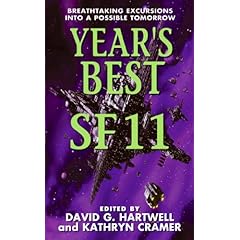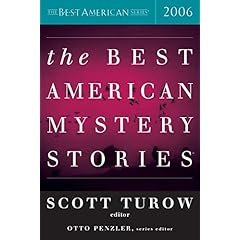by Matthew Jarpe
Inspired by his zippy "City of Reason," we sought out and found Matthew Jarpe's Web site, where he has posted two more stories he sold to Asimov's. Both have a lot in common with "Reason." They pile on the unlikely events in a steady, but credible way. Both are whimsical at times and do a neat job of tranlating present-day experience (a junk man, a corporate legal battle) into an sf context (a junk man who collects space junk, a corporate legal battle waged from the gravity well of a black hole [maybe the ultimate solution to the slow turn of the wheels of justice 8-) ]).
Of the two, "Vasquez" is the better, we thought. It's more upbeat and has a faster pace. "Captains" mixed two themes, because it switched POV from the space station above the hole to the suface of the planet, and back. On the surface, Jarpe employs (as he does repeatedly, and usually successfully, throughout these stories) a familiar sf trope: in this case, a caste-based corporate culture. (Hmmm... this is similar to Mike McQuay's novel "Jitterbug." In a world where everyone wants to be the next, "next Heinlein," could Jarpe be the next McQuay? I'd be glad if that were true.) It's a workable idea, but it slightly conflicts with the rest of the tale by drawing attention to itself without adding much. We thought he had more material waiting to be developed back on the station, where the cultural effects of leading a vast industry from a location where time runs m-u-c-h more slowly than elsewhere should have been more visible. For example, the protag has lawyers reviewing on the station what his lawyers were doing in flat space. Why? By the time they're done, those flat-space lawyers wil be decades beyond the material reviewed. We thought there were lots of opportunities for exploitation of this, but maybe next time. (One idea we had: make the space station long enough that different floors' clocks run at different rates; each "slower" floor takes its reports from the next "faster" one, allowing the hierarchy to function in something like a traditional management structure, while still requiring that each floor only burden the next one with a summary of its work.)
"Vasquez" was more light-hearted and, at the end, even a bit too sugar-coated. Once again, where other writers would have lost us in the sequence of fortuitous/serendipitous events, this story didn't put us off with all of its unlikely events. Somehow, they still worked in a convincing way. Maybe there's no more reason to it than that it would be
just so cool if all of this were real.
We'll remember this author.







